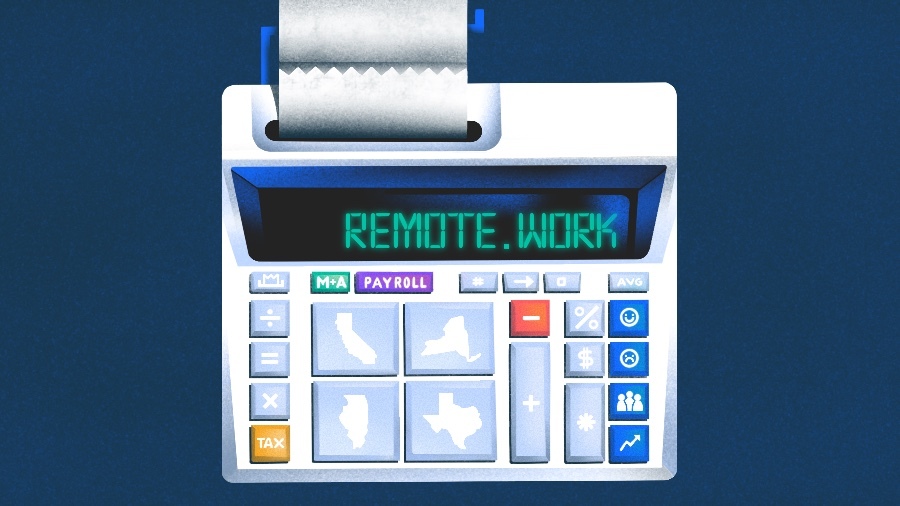Before March of 2020, almost every one of Wise Systems’ employees showed up to work in its Cambridge, Massachusetts, office daily to be part of that intangible, but coveted, piece of every tech startup’s identity: office culture.
Subscribe to the Crunchbase Daily
It’s not that Wise Systems, which makes AI and autonomous delivery solutions, wasn’t prepared for remote work. The company already used video and chat software, had shared drives that could be accessed from outside of the office, and even had a few reliable employees who moved away and were the exception to the in-office rule.
But the startup’s bricks-and-mortar-based vision for its future changed dramatically after a year and a half of pandemic-induced remote work while the company doubled in size, giving way to a new office culture spread across homes in eight states and an expansion to Japan.
“It’s such a tough and competitive market for employment,” Layla Shaikley, a co-founder at Wise Systems, told Crunchbase News in a recent interview. “So when our peers in technology—including much larger peers and usually public peers—started offering remote opportunities for their senior staff and folks with experience, we knew that not only should we follow suit, but it made sense to follow suit.”
Wise Systems is one of many growing startups making tough decisions on the fly about where and how to invest in their future and whether to order their talent back into the office with mandated vaccinations and regular coronavirus testing, or to keep adapting to an increasingly virtual world. But, as Shaikley knows, the choice comes with complicated tax, payroll, cultural and even M&A or IPO questions.
Despite those complications, a trend is emerging: one in eight U.S. paid job postings offered remote work as of August 2021, according to LinkedIn data. That’s an enormous jump from the one in 67 job postings that allowed for remote work in March 2020, according to the data.
Employees are showing a clear preference for more flexibility when it comes to where they log their hours, many even being willing to take a pay cut to stay home, according to a recent survey by insurance platform Breeze.
Meanwhile, paid remote jobs on LinkedIn attracted more than twice the views and nearly two and a half times the applications compared to on-site job postings in August, driven in large part by workers living in smaller cities, according to LinkedIn data. That’s an attractive statistic for employers in the tight labor market that emerged during the pandemic.
But before pushing publish on a remote-help wanted posting, startup HR, payroll and accounting experts say companies should first invest in some of the more technical and legal aspects if they want to avoid tax penalties, high turnover or take a hit when it’s time to go public.
Here are three main considerations worth noting:
Taxes
While some startups moved to remote work as a reaction to the pandemic, Wise Systems made a conscious decision.
“We had discussions at the leadership level of ‘Do we invest in more office space, or the ability to register in more states?’” Shaikley said. “We do have a pretty consistent number of people who still go to our headquarters in Cambridge, and we have a satellite office in Montreal, … but it’s definitely a minority.”
Indeed, expanding to remote work across the country or world may not require the hassle of closing on new real estate, but it does take an investment of time, money and expertise in state tax law, said Scott Orn, chief operating officer for startup HR and accounting firm Kruze Consulting. He advises hiring a firm or an in-house expert who knows the rules for all of the states the company chooses to hire in.
“An employer has to register to do business in every state [they have employees] and pay payroll taxes,” he said. “Almost every state has two registrations, but some states, like New York, have even a third one where they have workers’ comp through the state.”
Those state-by-state nuances are where a company without a payroll tax expert can stumble, and that’s where penalties and interest start to add up.
“Sometimes there’s risk and these state agencies are so behind that you don’t always get a quick response, you don’t get the payroll tax numbers,” Orn said. “All of a sudden, your payroll can get jammed up.”
Pay
Over the past year, small cities like Bend, Oregon; Asheville, North Carolina; and Wilmington, Delaware, have emerged as “remote work havens” with residents in them making up an outsized portion of the remote work applications over the last year, Anne Trepasso, communications manager at LinkedIn told Crunchbase News.
That matches with what Orn said he sees most often when employees choose to move and work remotely: They opt to live somewhere less expensive than where they started.
But an unanswered question employers like Wise Systems are still grappling with is what to pay an employee who moves or gets hired to do the same job workers in expensive cities are doing—or vice-versa.
Two schools of thought have emerged on the matter.
Orn is a proponent of keeping salaries the same for employees who start in an expensive city and then choose to move to a less expensive locale.
“You’re just going to churn employees [if you lower their salary], and the cost of churning an employee and hiring someone new, it’s just astronomical,” he said. “It’s not just the dollar amount of recruiting and time spent interviewing, but the lost productivity of someone leaving, which is crazy.”
Meanwhile, location is a valid consideration when it comes to pay rate, said Kaitlyn Knopp who is the CEO of compensation platform Pequity.
In fact, it’s one of the relatively few considerations that employers can take into account when deciding pay.
“Fair is a really tricky word to use in compensation, because a lot of the decisions that people are arguing around remote work comes down to personal choice,” she said. “The fundamental reason that we work is to make money to afford rent, to afford food, to have time and resources for our family and ourselves. Those things change prices in different locations.”
The key, whatever the decision, is to decide early how to handle salaries for remote workers and then find a way to track and analyze pay rates to ensure the standard is being applied equally across the board, said Knopp.
Exits
While salary and taxes are an issue that every company has to consider, one factor that is unique to startups is the question of a merger, acquisition or IPO in the future. Even if startups are ready to embrace the new, virtual world or remote work, are investors?
“I think probably in the early days of COVID, when this whole working remotely was a shock to the system, it could have been an issue,” Orn said. “But I think now everyone’s kind of progressive enough to know, that’s okay and I don’t think there’s a penalty. In fact, if it’s a bigger company that’s already embraced remote, that might actually be a benefit.”
M&A or IPO wasn’t top of mind for Wise Systems when it went remote, Shaikley said.
“I think because we’re in the growth stages, we’re so focused on revenue and product that we haven’t gotten that far yet,” she said. “But we know that with a good product and good revenue, you get more opportunity rather than less.”
But when, or if, that day comes for Wise Systems or companies like it, Orn said it will be key to have a tax professional in the room—or on the Zoom call—to assure that every tax identification number has been secured and every quirky state law has been considered. That will be an important part of the due diligence process going forward, he said.
“Whether people realize it or not, you’re being judged the whole time through due diligence; they’re trying to figure out ‘Is this person responsible? Are they a good bet?’” he said. “You want to go into it with an expert because it’s not fair to the founder to not have someone on their side.”
Illustration: Dom Guzman

Stay up to date with recent funding rounds, acquisitions, and more with the Crunchbase Daily.




![Illustration of "clicking" on an AI brain {Dom Guzman]](https://news.crunchbase.com/wp-content/uploads/AI_Brain-470x352.jpg)

![Illustration of a guy watering plants with a blocked hose - Global [Dom Guzman]](https://news.crunchbase.com/wp-content/uploads/quarterly-global-3-300x168.jpg)
67.1K Followers